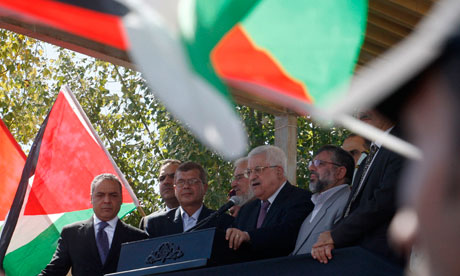So when Soames speaks out, as he did on the Middle East on Tuesday night, the Conservative party takes note.
In a strongly worded statement, Soames warned that Britain would face "severe" consequences if it abstains in a vote on Palestinian statehood at the UN on Friday. William Hague will tell MPs on Wednesday that Britain will abstain if a vote is held at the UN security council.
Mahmoud Abbas, the Palestinian president, may push for a vote if he can muster nine supporters on the 15-strong security council. That may be too high a hurdle because at least three of the EU members of the security council – Britain, France and Portugal – will abstain. It is expected that Germany, which takes great care not to offend Israel at the UN for obvious historical reasons, may also abstain.
At one level the vote, if it happens, would be academic. This is because the US would exercise its veto. But Soames, who is president of the Conservative Middle East Council (CMEC), believes that Britain will lose the goodwill it has built up in the Middle East during the Arab Spring if it abstains. He comes close to warning that Britain would stand accused of double standards for supporting the idea of self determination for every country in the Middle East and then denying that right to the Palestinians.
This is the statement which is also signed by Baroness Morris of Bolton, the chairman of CMEC:
We believe that Britain should vote in favour of Palestinian statehood at the UN Security Council on November 11th. As a good friend of Israel and Palestine, the UK has always supported a viable sovereign and secure Palestinian state alongside a secure Israel and this vote asks no more than that we should vote accordingly.
This is the time for the UK to stand on the right side of history – especially because of our historical involvement through the British Mandate in Palestine and the Balfour Declaration. Public opinion is strongly on the side of the Palestinians, as shown by opinion polls showing 71% support for the Palestinian bid to be an independent state. Parliament should make its voice heard rather than standing on the side-lines as a passive spectator.
The consequences of an abstention would be severe. The UK cannot support the right to self-determination in every country in the Middle East and then deny the same right to the Palestinians. The World Bank, IMF, UN and EU have all assessed the performance of the Palestinian Authority and reported that it is ready for statehood. President Obama promised in his speech to the UN last year that Palestine would be "a new member of the United Nations by September 2011. That promise was endorsed by the UK. We should honour that promise.
If the UK supports recognition, this could open the way to negotiations between Israel and Palestine talking to one another for the first time on a basis of equality as neighbours.
If the UK votes against, this would run the risk of playing into the hands of extremists on both sides and spiralling into violence.
Some Conservatives believe that David Cameron is not adopting an even-handed approach on the Palestinian statehood declaration. Tony Blair, as the envoy for the "quartet", has been playing a role in the negotiations. In the run up to the meeting of the UN general assembly in September I blogged about how Britain might be prepared to vote for the mild "Vatican option" in which the Palestinian Authority would be upgraded to a permanent non member at the UN. In the end Abbas lodged an application for full membership, prompting Friday's security council meeting.
Tory critics claim that the prime minister is nervous about taking a different stance to the US although Britain did vote to condemn illegal Israeli settlements in February. The US used its veto.
But ministers say that Britain is adopting a cautious approach for two reasons. Ministers:
• Hope to achieve European unity. Ministers believe that the EU, which is the largest single donor to the Palestinian Authority, is playing an increasingly influential role in the Middle East. Divisions among EU member states at the UN would undermine that influence.
• Believe that the best way, at the moment, to achieve a two state solution is through talks between the Israelis and Palestinians. Britain is prepared to review its stance on this and may eventually be more supportive of the Palestinian position at the UN if Israel refuses to give ground on settlements. Nicolas Sarkozy highlighted widespread European frustration with Binyamin Netanyahu when he was caught on a microphone at the G20 summit telling Barack Obama that the Israeli prime minister was a "liar".
